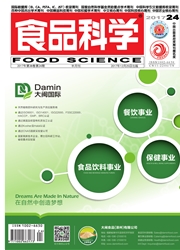

 中文摘要:
中文摘要:
为探索重组芳香基硫酸酯酶水解龙须菜粗多糖的动态过程变化,同时为重组酶的应用提供基础数据,以p ET-28a为表达载体,在大肠杆菌(E.coli)中诱导表达获得能特异性水解硫酸酯的重组芳香基硫酸酯酶.并利用重组芳香基硫酸酯酶水解海藻龙须菜中的硫酸基团,以硫酸基含量和硫酸基脱除率为指标,利用单因素试验研究各因素对龙须菜粗多糖硫酸基水解过程的影响.试验确定了脱除龙须菜粗多糖硫酸基团的工艺条件,结果表明,重组芳香基硫酸酯酶水解龙须菜粗多糖的适宜工艺条件为:水解温度40℃,p H值7.0,初始底物5 g/L,加酶量108.14 U,振荡速率120 times/min,酶解反应2 h,在此工艺条件下脱除了78.4%的硫酸基团,凝胶强度提高2.1倍,凝固温度、融化温度分别为38.4℃和91.3℃.重组芳香基硫酸酯酶在酶解过程中水解龙须菜粗多糖中硫酸酯表现出较高的活力.
 英文摘要:
英文摘要:
The arylsulfatase gene from a marine aerobic Gram-negative bacterium, Pseudoalteromonas carrageenovora, was cloned into pET-28a vector and expressed in E. coli BL21 ( DE3 ). The technical condi- tions for sulfate hydrolysis of Gracilaria lemaneiformis by recombinant arylsulfatase were optimized by single factor experiments based on sulfate content and sulfate removal rate. The optimum parameters for sulfate hy- drolysis by recombinant arylsulfatase were obtained as substrate concentration of 5 g/L, initial pH of 7.0, en- zyme dosage of 108.14 U, at 40 ℃, oscillation rate of 120 times/min and enzymatic duration of 2 h. After crude polysaccharide from Gracilaria lemaneiformis was treated with purified fusion recombinant arylsulfatase for 2 h at 40 ℃, the gel strength of the products increased by 2. 1 folds, and 78.4% of the sulfate in the crude polysaccharide was removed. The gelling temperature and melting temperature were 38.4 ℃ and 91.3 ℃, respectively. It was thus expected that the recombinant arylsulfatase could be used for the desulfa- tion of sulfated polysaccharides and applied in the production of low sulfated agar or agarose.
 同期刊论文项目
同期刊论文项目
 同项目期刊论文
同项目期刊论文
 期刊信息
期刊信息
